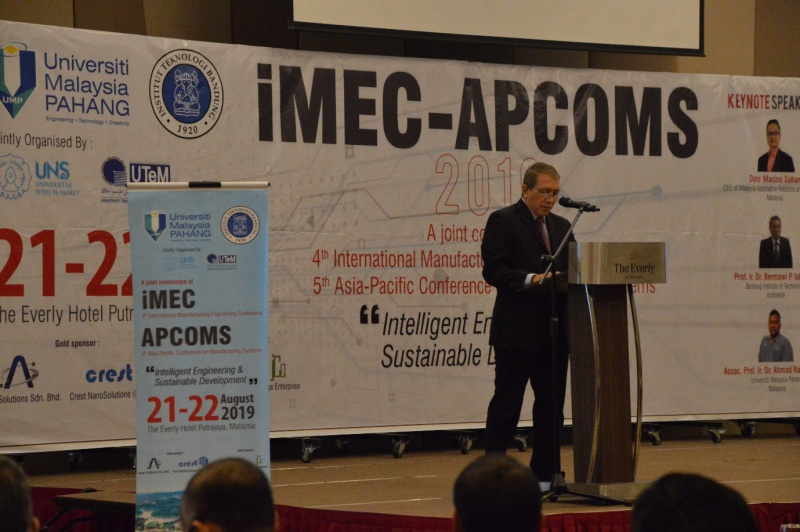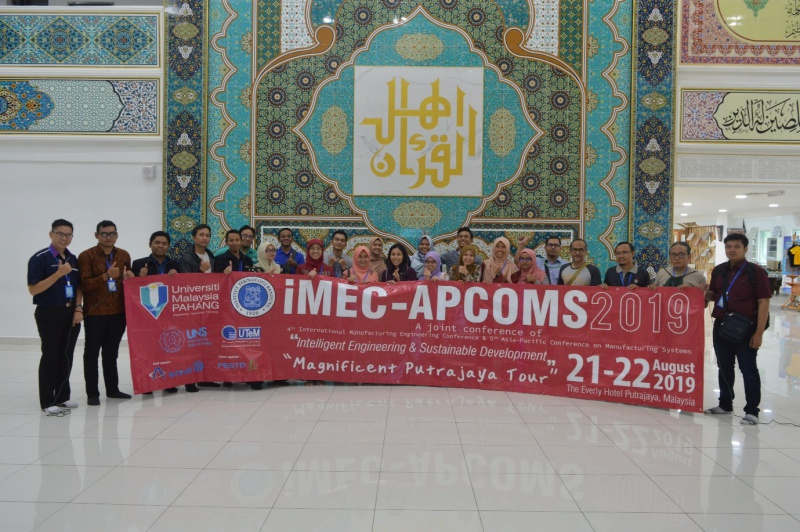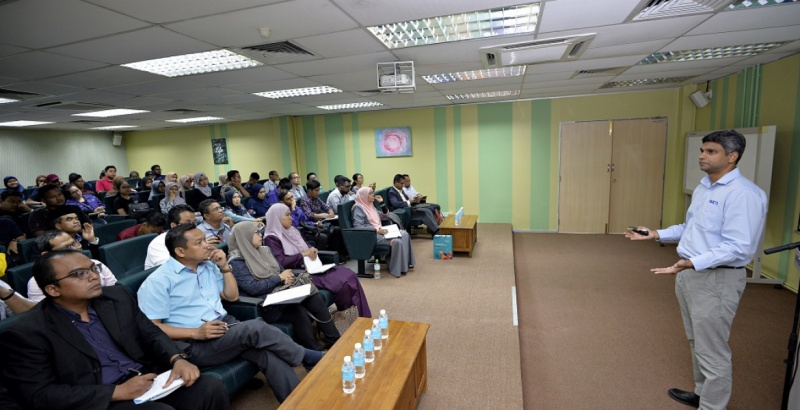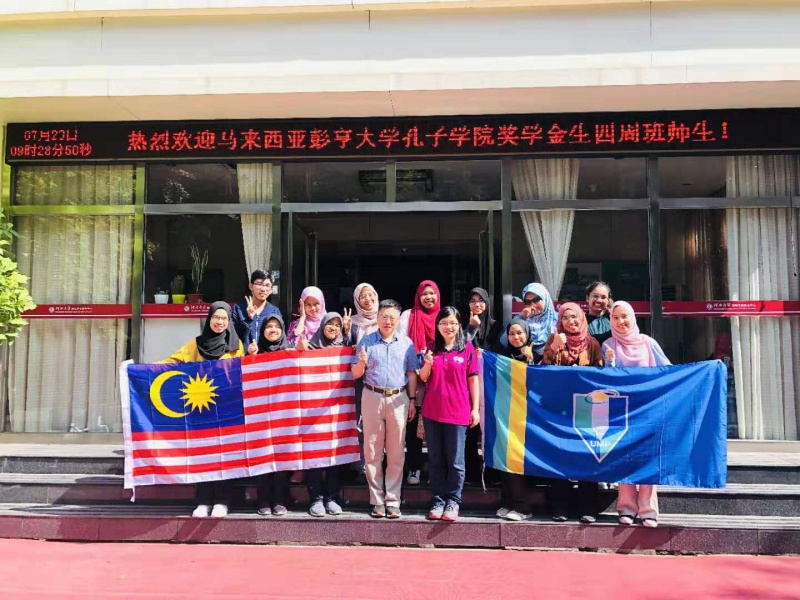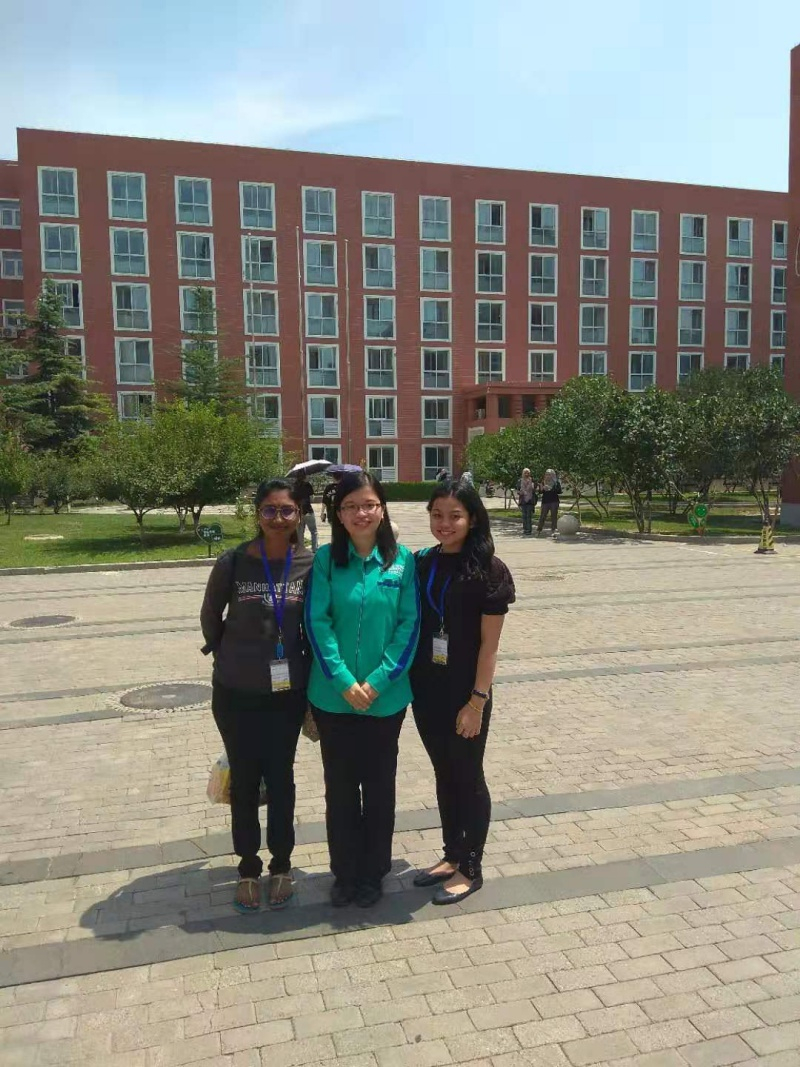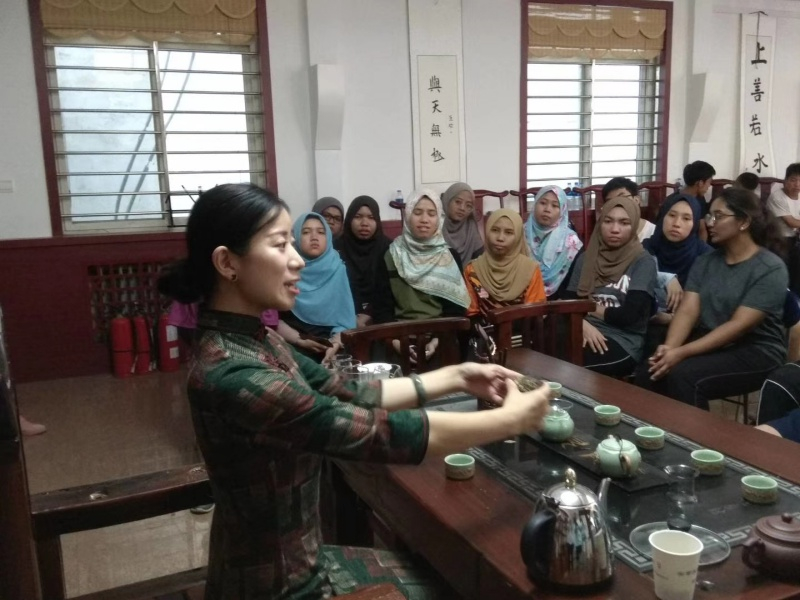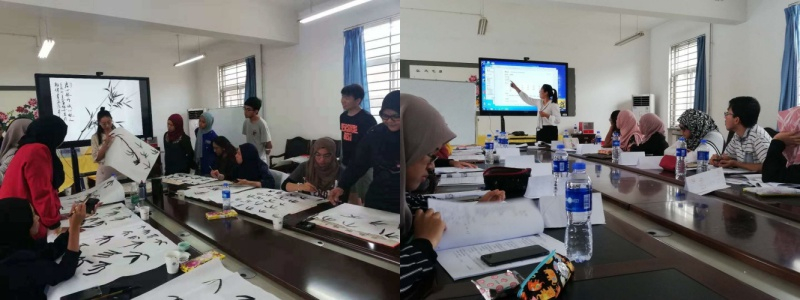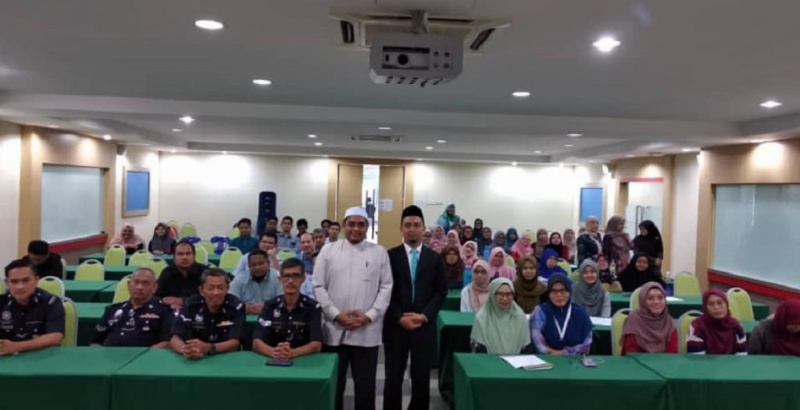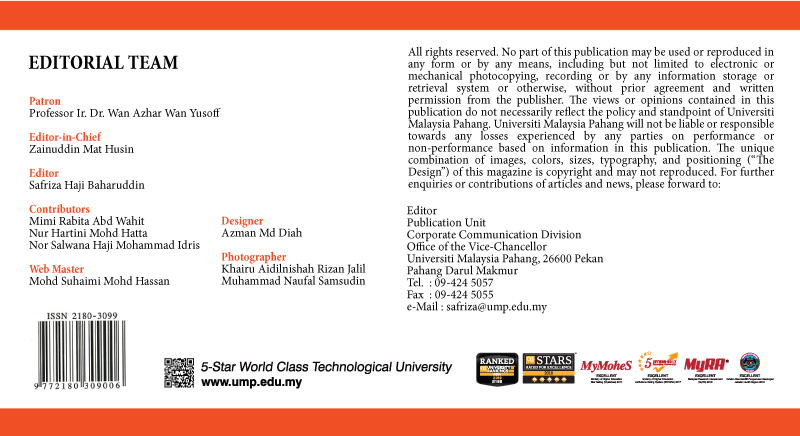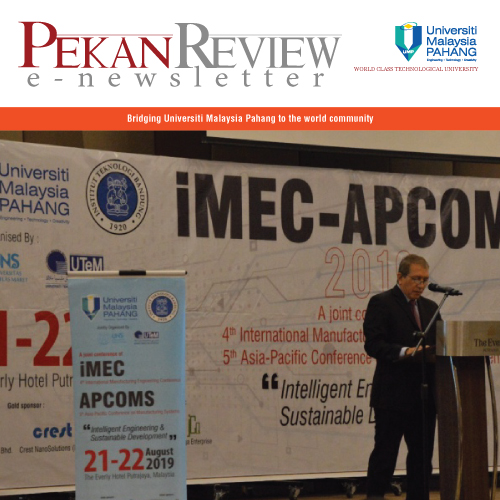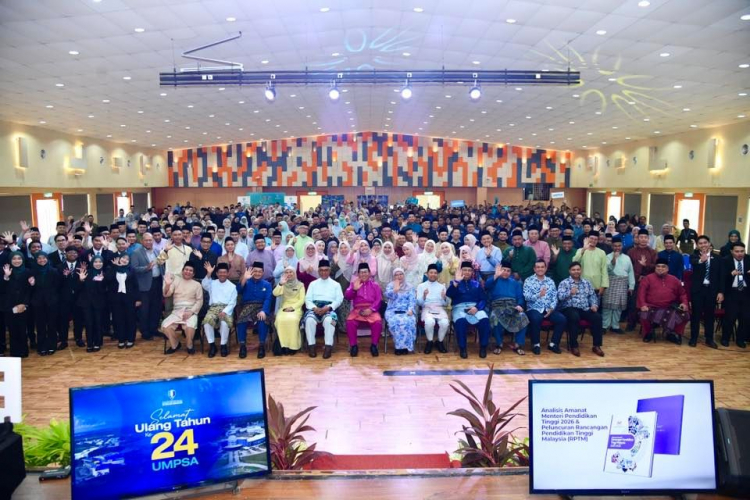 Campus Info iMEC-APCOMS 2019 the best platform to exhibit industry and manufacturing engineering research product
By: DR. NURRINA ROSLI, SECRETARIAT IMEC 2019 Faculty of Manufacturing and Mechatronics Engineering Technology (FTKPM) has successfully organized the 4th International Manufacturing Engineering Conference (iMEC) 2019 on 21st to 22nd August 2019 at The Everly Hotel, Putrajaya, Malaysia. For the third time, iMEC is co-organized with 5th Asia-Pacific Conference on Manufacturing System (APCOMS) 2019 which is owned by Faculty of Industrial Technology, Bandung Institute of Technology (ITB), Indonesia.
This is an extended collaboration between UMP and ITB, which is purposely to intensify knowledge sharing and experiences between higher learning institutions in Malaysia and Republic of Indonesia. This year, the conference brought ‘Intelligent Engineering & Sustainable Development’ as the theme to reflect acceleration of knowledge and technology in global manufacturing towards Industry 4.0. With aim to become the platform for researchers, academicians, scientists, students, engineers and practitioners around the world to present their latest findings, ideas, developments and applications related specifically to manufacturing engineering and other related research areas, the conference this year has successfully attracted more than 100 local and international participants including Indonesia, Bangladesh and India. The 4th iMEC 2019 has invited submission of high quality research papers reporting original work on, but not limited to the topics and sub-themes on Material, Manufacturing Processes, Manufacturing Automation and Manufacturing System.
The officiating event was carried out by the Member of UMP’s Board of Director, Professor Dato’ Ts. Dr. Rosli Mohd Yunus. The keynote sessions were held by the speech of Professor Ir. Dr. Bermawi P. Iskandar from Bandung Institute of Technology, Indonesia, Mr. Nizmar Mohd Nazar from Malaysia Automotive, Robotics and IoT Institute and Associate Professor Ir. Dr. Ahmad Razlan Yusoff from Faculty of Manufacturing and Mechatronics Engineering Technology. The organizing committee was also proud with the presence of FTKPM’s Industrial Advisory Panel from MIMOS Berhad, Proton Holdings Berhad and Triple EEE Sdn. Bhd. during the opening ceremony. This two-days conference has successfully brought together local and international academicians, researchers and industry players for sharing their latest findings, ideas, developments and applications as well as industrial exhibitions related specifically to manufacturing engineering and other related research areas. Participants also enjoyed the sight-seeing tour scheduled by organizing committee. It is hopes that with the success of this fourth conference, Universiti Malaysia Pahang (UMP) will be one of the best universities known in the field of manufacturing engineering thus creating a strong academic network among researchers in Malaysia and overseas. Research and Innovation Creating new technology for student preparation towards IR4.0
By: NUR SA'ADATUL AFZAN JUSOH, CORPORATE COMMUNICATION DIVISION Since the advent of the Fourth Industrial Revolution (IR 4.0) in the mid-2016 with automation technology, new challenges have emerged in all of the country's service and industrial sectors. It demands a change in all aspects of digital transformation to remain competitive and accelerate the progress of the modern world, as it will have a direct impact on the future of the current working environment. Robotics technology, Internet of things (IoT), artificial intelligence (AI), data analytics, image processing, software, mobile communication systems, three-dimensional (3D) printing, cybersecurity, simulation and digital system integration are among the new elements that have begun to take hold over the existing job functions and systems. Among the areas that have also moved forward with the development of this revolution is education, where a serious focus is given towards the cooperation between educational and technical institutions and industries. In higher education, for example, it revolves around talent development and the areas of new technologies, digital and engineering that aim at preparing graduates for the job market in intelligent manufacturing. Penang Skills Development Centre Chief Executive Officer, Muhamed Ali Hajah Mydin outlined three key elements needed in the transition to IR 4.0, namely talent, process and technology. “Talent focuses on individuals and entire organisations by emphasising strategies for creating a relevant workforce. “Meanwhile, technology focuses on AI, networking and automation technologies at three different levels while process focuses on management systems involved in the operation, supply chain and product lifecycle,” he said. However, he mentioned that we would also face some challenges that have been identified, especially from the industry, graduates, government and institutional levels. “For example, the industry will face new and incompetent graduates; the challenges of today’s graduates who like to switch jobs within three years; and unstructured three to six months of industrial training. “In fact, the Generation Y and Z graduates are faced with less exposure to real-world situations where they may be technically proficient but lack of collaboration and problem-solving skill,” he said. Therefore, he also advised graduates to be exposed to industrial psychology. Meanwhile, he added, the government is receiving pressure from the manufacturing industry, especially from multinational companies (MNCs) on human resource matters. “The involvement of various ministries such as the Ministry of International Trade and Industry (MITI), the Ministry of Education and the Ministry of Human Resources should also be well coordinated. “Meanwhile, at the institutional level, such as universities and polytechnics, challenges exist in terms of survival to address the rapid pace of technological change but at the same time bound to the requirements of the Malaysian Qualifications Agency (MQA) and the Department of Skills Development,” he said. Muhamed Ali also suggested that the higher education system might require some changes as lecturers and graduates need to learn and create something new together. He attended the Professional Talk Series titled 'Transition Preparation: Talent, Technology, Process' organised by the Industry & Community Network Centre (ICoN) at the ICoN Seminar Room, UMP Gambang Campus on 24 September 2019. Also present was the Director of the Industry & Community Network Centre (ICoN), Associate Professor Dr. Nurul Hazlina Nordin, Manager of ICoN, Mohd. Raizalhilmy Mohd Rais, UMP associates and other educational institutions around Kuantan. Amirah Ibrahim, a student of the Faculty of Mechanical and Automotive Engineering Technology, thinks the program provides an opportunity to gain new knowledge on technology, mainly on how the IR 4.0 migration process can be implemented successfully. “It can provide ideas and inspiration to motivate students and encourage them to invent or improve technology to meet the current needs,” she said. Academic & International Four-Week Mandarin Study Programme in China
By: YONG YING MEI, DIRECTOR OF UMP CONFUCIUS INSTITUTE The Confucius Institute (CI) of Universiti Malaysia Pahang (UMP) organised a four-week Mandarin study programme in China held between July and August this year. It was the first programme organised following the signing of a Memorandum of Agreement (MoA) with Hanban (Confucius Institute Headquarters) last year.
Fifteen students from CI were sponsored for the programme, which was held during summer, under the Confucius Scholarship Hanban from China. Thirteen of them attended the programme in Hebei University (HBU), China starting from July 22 until August 19, 2019 and the remaining two at Beijing Foreign Studies University (BFSU), China from July 28 until August 24, 2019. They studied the Mandarin language and Chinese culture as well as attended workshop, sat for tests and visited homes of Chinese families.
They were exposed to various components of the Chinese culture such as the martial art of wushu and tai chi, learned the finer things in making Chinese tea, calligraphy, folk songs, arts of paper cutting, traditional knots, painting and dumplings and watched the opera. The students learned a lot and had a great time studying about China, its people and culture and were full of enthusiasm and commitment. In wrapping up the programme, CI Director, Yong Ying Mei congratulated the students who had passed their tests with flying colours.
She also expressed her gratitude to CI Administrative Assistant, Nornashua Farhani Abdul Ghaffar for her help in ensuring that everything went smoothly for the students who attended the programme. Yong said Nornashua had helped with the application of the scholarship and other matters so the students were able to go and study in China. Campus Info Talk on the End of the World at Mahabbah Carnival 10.0
By: NUR SA’ADATUL AFZAN JUSOH, COMMUNICATION CORPORATE DIVISION Muslims have always been reminded about Dajal, the evil figure that will appear towards the end of the world and said to have the power to manipulate people, and that every Prophet and Rasul knows about Dajal. Among the powers that Dajal is said to have is to be able to turn a barren land into a fertile one, cure a sick person or resurrect the dead. Prophet Muhammad S.A.W, even prayed hard to Allah for His protection against the evils of Dajal and told Muslims to be cautious of Dajal. This was the introduction remark by Senior Assistant Director, Department of Wakaf, Zakat and Hajj (JAWHAR) Ustaz Haji Mohd Meeftah Anuar in his talk titled, Akhir Zaman (End of the World) that was held at Tun Fatimah Hall, UMP Gambang Campus on September 27, 2019. He said that in their lives, people would face five things – the Satan, Jinn, Qarin, lust and the humans themselves, whispering temptations and enticing them to do things forbidden by the religion. “Only iman can help prevent us from getting swayed by these temptations and seductions. Daily zikir, selawat and istighfar can help and act as a protection against these lures,” he added. On the major signs of the end of the world, Ustaz Mohd Meeftah said apart from the emergence of Dajal, there were nine other major signs such as the smoke or Dukhan that covered the earth, blocking the sun and causing extreme weather changes. The haze that occurred in this country and that of the neighbouring country was just a fraction of Dukhan, he added. “Allah S.W.T. will also send Prophet Isa a.s to a white tower at the east of Damascus, with two angels, to destroy Dajal. His arrival is to help the servants of Allah, those who are pious and obedient to Allah. “After Dajal is destroyed, Yakjuj and Makjuj will appear and these creatures are horrendously mighty to a point Prophet Isa a.s. prayed hard to Allah who will then send down a disease that will cause the creatures to die,” he added. He also said the sun would rise from the west but prior to that, the world would be in darkness for two or three days and when the sun rose again in the west, Allah S.W.T. would have, by then, firmly close the gate for repentance. “The next sign will see the emergence of a four-legged creature from earth, Dabbah, which will meet and talk to the people using a language that the people will understand. The creature will bring along two tools – the stick of Prophet Musa and the ring of Prophet Sulaiman. “If the creature approaches someone and extends the stick of Prophet Musa, the face of the person will glow and the opposite will happen if the creature extends the ring,” he said. Ustaz Mohd Meeftah also said earthquake would happen three times that would eventually led to its destruction. “The earthquake will happen in the west, east and in the Arab countries. The biggest sign is the tenth sign – a fire will appear that will shepherd humans to an assembly point. “Whatever it is, Muslims should be prepared, be faithful, pious and virtuous as these are the sanctifications that are not explained in length and no one knows it better except for Allah S.W.T.” he added. The audience that came to listen to the talk comprised staff and students of UMP and representatives from government agencies. Among those in the audience were six non-Muslim students and one of them was Eugene Leong Kai Yi, a third year student from Faculty of Chemical and Process Engineering Technology who came with her friends to learn about Islam and the akhirat. Nolia Jusoh from Jaya Gading said programme such as this served as a good reminder because being humans, people had the tendency to be careless and loose. She hoped that the Islamic & Human Development Centre (PIMPIN) would continue to organise programmes such as this in the future. |
- 78 views


